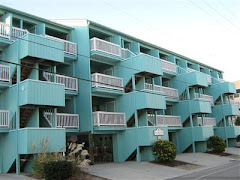
The (Raleigh)
News & Observer has an
interesting piece on college students and professors studying the N.C. coast to get a "baseline" for the
just-in-case chance that Gulf oil makes it this far. (Fingers crossed that it won't!)
Seven people walked the 50-meter-long seine net into chest-high water, then slowly returned to the beach with scores of Florida pompano, striped mullet and gulf kingfish, among others. Destined for labs at UNC Wilmington, the fish, along with water and sediment samples gathered nearby, will be used to create a baseline measurement of what the coastal environment is like now, unsullied by oil from the spill in the Gulf of Mexico or anywhere else.
The oil apparently has not left the gulf. State officials who gathered last week at UNC-Chapel Hill for an oil-spill forum were told that the probability of crude reaching North Carolina was extremely small.
"It's beyond remote now," said Kenneth Taylor, disaster response coordinator for the N.C. Department of Environment and Natural Resources. "The oil is breaking up in the gulf all by itself."
But that does not mean the science has stopped. On Wednesday, about a dozen researchers, many of them students, worked with UNC Wilmington professors to gather samples. N.C. Sea Grant provided $6,000 for the research, which will eventually encompass visits to six beaches, from Ocean Isle to Hatteras.
...
In the weeks immediately following the Deepwater Horizon disaster in the gulf, scientists along the East Coast began forecasting the oil's movement. The National Center for Atmospheric Research released a computer model that showed how currents could bring oil to North Carolina waters, though the conditions that would have made that happen haven't materialized.
This week, Gov. Bev Perdue signed into law a bill that lifts the cap on damages that can be recovered as the result of an offshore oil spill. She had previously directed state officials to update the state's oil spill contingency plan to prepare for the unlikely event that the leaked BP oil makes it to North Carolina.
In June and July, the state gathered extensive samples of sea life from 34 spots up and down the coast. Oysters, shrimp, crabs and a wide variety of fish were collected as part of a separate effort to create a snapshot of an oil-free environment.
Even if tar balls never reach the North Carolina coast, the samples gathered and the science collected from them will not go to waste.


.jpg)








No comments:
Post a Comment